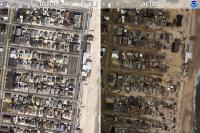-
IRS commissioner confirms agency employs cellphone tracking devices

IRS commissioner John Koskinen on Tuesday confirmed to lawmakers that his agency employed StingRay cellphone tracking devices. Koskinen said that the agency’s use of StingRay devices is limited to its criminal investigations division, which is responsible of investigating money laundering, terrorism, and organized crime cases. “It can only be used with a court order. It can only be used based on probable cause of criminal activity,” Koskinen said, the Hill reports. “It is not used in civil matters at all,” he continued. “It’s not used by other employees of the IRS.”
-
-
Centralized leadership, major reform needed to bolster U.S. biodefense
A comprehensive report on U.S. biodefense efforts calls for major reforms to strengthen America’s ability to confront intentionally introduced, accidentally released, and naturally occurring biological threats. The report details U.S. vulnerability to bioterrorism and deadly outbreaks and emphasizes the need to transform the way the U.S. government is organized to confront these threats. Recommendations include centralizing leadership in the Office of the Vice President; establishing a White House Biodefense Coordination Council; strengthening state, local, territorial, and tribal capabilities; and promoting innovation through sustained biodefense prioritization and funding.
-
-
Online tool maps terrorist networks, behavior over time
To allow a better understanding of how terrorist organizations network and function over time, the National Consortium for the Study of Terrorism and Responses to Terrorism (START) has launched the Big Allied and Dangerous (BAAD) online platform. The tool features updated, vetted, and sourced narratives and relationship information and social network data on fifty of the most notorious terrorist organizations in the world since 1998, with additional network information on more than 100 organizations. The research team plans to expand the database and online platform to include more than 600 terrorist organizations.
-
-
Carter details shift in U.S. ISIS strategy
Speaking before the Senate Armed Services Committee, Secretary of Defense Ashton Carter said that the U.S. military will intensify airstrikes and may carry out unilateral ground raids as it steps up its campaign against Islamic State. The shift in U.S. policy comes after the administration had concluded that the previous approach, which was based on equipping and training carefully vetted moderate Syrian rebels, has failed. Carter said similar missions were likely as U.S. forces adapted to the fight in Syria and Iraq.
-
-
Syria’s civil war, Europe’s refugee crisis the result of spikes in food prices: Experts

The disintegration of Syria and Europe’s refugee crisis are only the latest tragic consequences of two spikes in food prices in 2007-08 and 2010-11 that triggered waves of global unrest, including the Arab Spring. Researchers have traced these spikes and spiraling crises to their root causes: deregulated commodity markets, financial speculation, and a misguided U.S. corn-to-ethanol fuel policy which removes nearly five billion bushels of corn from markets each year.
-
-
FEMA funding for post-Sandy recovery in New Jersey exceeds $6.8 billion

In the three years since Hurricane Sandy scored a direct hit on New Jersey, FEMA has provided $6.8 billion to date to help the state recover and rebuild. FEMA Public Assistance, which provides funds for repair and rebuilding of infrastructure and public facilities as well as necessary work such as debris removal and emergency response, has obligated $1.809 billion in Public Assistance funds towards repair and rebuilding projects in New Jersey.
-
-
Obama considering deploying U.S. troops inside Syria, closer to front lines with ISIS
Defense Secretary Ashton Carter and other top national security officials have presented President Barack Obama with their recommendation to move U.S. ground troops into areas in Syria and Iraq, and have them assume battlefield-related roles, which would likely bring them into direct contact with Islamic State militants. The proposals reflect a growing recognition that the strategy the United States has pursued against ISIS so far has failed to deliver satisfactory results.
-
-
IRS employed cellphone-surveillance technology
The IRS spent $65,652 on surveillance technology which tracks people by capturing their cellphone calls through StingRays – devices which mimic legitimate cell towers. The devices are also known as IMSI-catchers or cell-tower simulators. In addition to locating cellphone users, StingRays also use the signals to identify the owner of the phone, and may also be able to capture the phone owner’s contacts, messages, and other content off the phone. More than a dozen federal agencies, and local police in twenty-two states, have also employed the technology.
-
-
Amendment to CISA: U.S. courts could pursue foreigners for crimes abroad against other foreigners
A controversial amendment to an already-controversial cybersecurity bill will allow U.S. courts to pursue, convict, and jail foreign nationals in cases in which these foreigners committed crimes against other foreigners on foreign soil. The amendment to the Cybersecurity Information Sharing Act (CISA) cleared a key Senate hurdle on Thursday. It aims to lower the barrier for prosecuting crimes committed abroad.
-
-
EFF leads privacy advocates in opposing CISA
Privacy advocates have intensified their campaign against the Cybersecurity Information Sharing Act (CISA), which the Senate will vote on sometime next week. The Electronic Frontier Foundation (EFF) says it vehemently opposes the bill, as well as amendments which would expand the Computer Fraud and Abuse Act. EFF says that CISA is fundamentally flawed. The bill’s broad immunity clauses, vague definitions, and what EFF describes as “aggressive spying powers” combine to “make the bill a surveillance bill in disguise.”
-
-
Ruling shows Europe still vexed over NSA spying, leaving U.S. companies in legal limbo
For over fifteen years, the Data Transfer Pact between the European Union and the United States, more commonly known as Safe Harbor, had ensured that companies with EU operations could transfer online data about their employees and customers back to the United States despite stark differences between U.S. and European privacy law. Earlier this month, U.S. companies operating in Europe got some unwelcome news: Safe Harbor had been ruled invalid. The European court’s ruling has serious implications for these companies’ business models and profitability, leaving many scrambling to find solutions. But it also exposes a fundamental cultural rift between the U.S. and Europe’s conceptions of privacy – one that a new agreement won’t be able to paper over.
-
-
New tool allows users to see how their personal information is used on the Web
Navigating the Web gets easier by the day as corporate monitoring of our e-mails and browsing habits fine-tune the algorithms that serve us personalized ads and recommendations. But convenience comes at a cost. In the wrong hands, our personal information can be used against us, to discriminate on housing and health insurance, and overcharge on goods and services, among other risks. “The Web is like the Wild West,” says one researcher. “There’s no oversight of how our data are being collected, exchanged and used.”
-
-
U.S. should lead climate change fight to bolster global stability: U.S. defense, diplomacy leaders
Forty-eight former U.S. leaders, both Republicans and Democrats – among them secretaries of state and defense, national security advisers, leaders of the intelligence community, diplomats, generals in all four branches of the armed services, senators, and members of the House of Representatives – have published an open letter in the Wall Street Journal which called on U.S. political and business leaders to “think past tomorrow” and lead the fight on climate change. The U.S. security establishment has long recognized the threat posed by climate change to U.S. national security, defining climate change as a “threat multiplier,” adding fuel to conflicts. Security experts and military leaders no longer regard climate change as only a threat multiplier, but rather as s serious danger on its own – with droughts, sea-level rise, food shortages, and extreme weather events triggering migration and armed conflicts.
-
-
Justin Trudeau: Canada will withdraw its fighter jets from anti-ISIS campaign
Canadian Liberal prime minister-designate Justin Trudeau, in his first press conference after leading the Liberal Party back into power in Monday’s federal election, has confirmed that Canada will withdraw its fighter jets from the U.S.-led coalition conducting operations against Islamic State in Iraq and Syria. Canada currently has six CF-18 fighter jets taking part in the U.S.-led bombing campaign. The outgoing Harper government planned to keep the fighter jets in the region until March 2016. Canada has also deployed about seventy Special Forces troops to northern Iraq to train Kurds. During the election campaign Trudeau appeared to indicate that this mission would continue.
-
-
ACLU lawsuit seeks disclosure of details of CIA drone program
The American Civil Liberties Union (ACLU) is continuing its campaign over CIA drone use with a lawsuit filed on Monday to force the CIA to turn over details about the U.S. clandestine drone war program. The ACLU lawsuit, coming a week after some of details of the program were leaked, asks for summary data from the CIA on drone strikes, including the locations and dates of strikes, the number of people killed and their identities or status.
-
More headlines
The long view
Factories First: Winning the Drone War Before It Starts
Wars are won by factories before they are won on the battlefield,Martin C. Feldmann writes, noting that the United States lacks the manufacturing depth for the coming drone age. Rectifying this situation “will take far more than procurement tweaks,” Feldmann writes. “It demands a national-level, wartime-scale industrial mobilization.”
No Nation Is an Island: The Dangers of Modern U.S. Isolationism
The resurgence of isolationist sentiment in American politics is understandable but misguided. While the desire to refocus on domestic renewal is justified, retreating from the world will not bring the security, prosperity, or sovereignty that its proponents promise. On the contrary, it invites instability, diminishes U.S. influence, and erodes the democratic order the U.S. helped forge.
Fragmented by Design: USAID’s Dismantling and the Future of American Foreign Aid
The Trump administration launched an aggressive restructuring of U.S. foreign aid, effectively dismantling the United States Agency for International Development (USAID). The humanitarian and geopolitical fallout of the demise of USAID includes shuttered clinics, destroyed food aid, and China’s growing influence in the global south. This new era of American soft power will determine how, and whether, the U.S. continues to lead in global development.
Water Wars: A Historic Agreement Between Mexico and US Is Ramping Up Border Tension
As climate change drives rising temperatures and changes in rainfall, Mexico and the US are in the middle of a conflict over water, putting an additional strain on their relationship. Partly due to constant droughts, Mexico has struggled to maintain its water deliveries for much of the last 25 years, deliveries to which it is obligated by a 1944 water-sharing agreement between the two countries.
How Disastrous Was the Trump-Putin Meeting?
In Alaska, Trump got played by Putin. Therefore, Steven Pifer writes, the European leaders and Zelensky have to “diplomatically offer suggestions to walk Trump back from a position that he does not appear to understand would be bad for Ukraine, bad for Europe, and bad for American interests. And they have to do so without setting off an explosion that could disrupt U.S.-Ukrainian and U.S.-European relations—all to the delight of Putin and the Kremlin.”
How Male Grievance Fuels Radicalization and Extremist Violence
Social extremism is evolving in reach and form. While traditional racial supremacy ideologies remain, contemporary movements are now often fueled by something more personal and emotionally resonant: male grievance.
